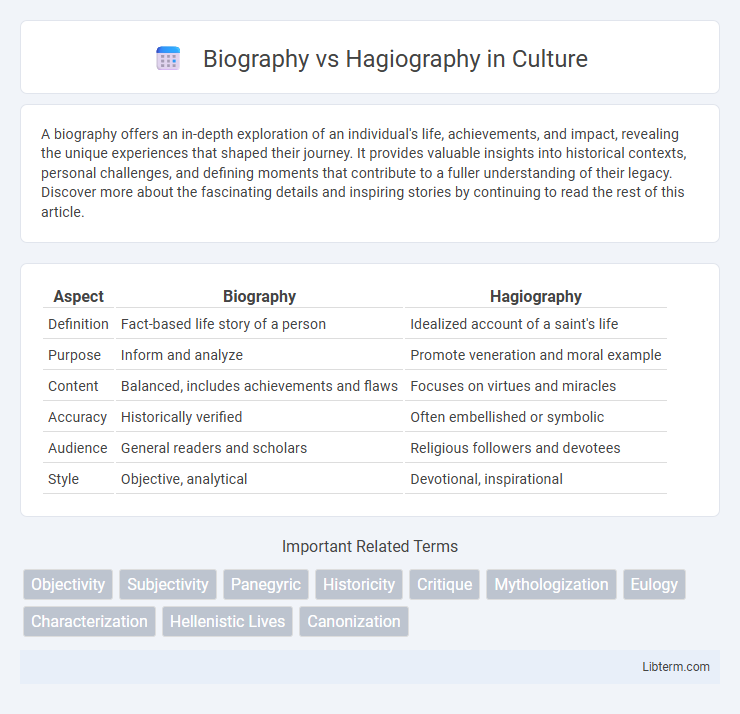A biography offers an in-depth exploration of an individual's life, achievements, and impact, revealing the unique experiences that shaped their journey. It provides valuable insights into historical contexts, personal challenges, and defining moments that contribute to a fuller understanding of their legacy. Discover more about the fascinating details and inspiring stories by continuing to read the rest of this article.
Table of Comparison
| Aspect | Biography | Hagiography |
|---|---|---|
| Definition | Fact-based life story of a person | Idealized account of a saint's life |
| Purpose | Inform and analyze | Promote veneration and moral example |
| Content | Balanced, includes achievements and flaws | Focuses on virtues and miracles |
| Accuracy | Historically verified | Often embellished or symbolic |
| Audience | General readers and scholars | Religious followers and devotees |
| Style | Objective, analytical | Devotional, inspirational |
Understanding Biography: Definition and Purpose
Biography is a factual account of a person's life, emphasizing accuracy and balanced perspectives to provide an authentic representation of their experiences and achievements. It aims to inform readers by presenting verifiable events, personal background, and contextual influences without exaggeration or adulation. Understanding biography involves recognizing its role in documenting history and human complexity, distinguishing it from hagiography, which idealizes its subject with a focus on veneration.
What is Hagiography? Origins and Meaning
Hagiography is a literary genre that focuses on the lives of saints and religious figures, often emphasizing their holiness and miracles rather than strict historical accuracy. Originating in the early Christian church, hagiographies aimed to inspire faith and convey moral lessons through exemplary narratives. Unlike biographies, which seek to provide an objective account of a person's life, hagiographies blend history with spiritual edification and devotional elements.
Key Differences Between Biography and Hagiography
Biography provides a factual, balanced account of a person's life, emphasizing accuracy, context, and critical analysis of both strengths and flaws. Hagiography idealizes its subject, often a saint or religious figure, presenting them in a mythical or glorified manner that highlights virtues and miraculous acts while omitting negative aspects. The key difference lies in biography's commitment to objective truth versus hagiography's intention to inspire devotion and veneration through selective storytelling.
Objectivity in Biography versus Hagiography
Biography aims to present a balanced and fact-based account of an individual's life, emphasizing objectivity through critical analysis of sources and acknowledgment of both achievements and flaws. Hagiography, by contrast, tends to idealize its subject, often omitting negative aspects to promote a sanctified or heroic image, thereby compromising factual accuracy and critical scrutiny. The distinction in objectivity is crucial, as biographies seek historical truth while hagiographies function more as devotional or propagandistic narratives.
The Role of Subjectivity in Hagiography
Hagiography often emphasizes idealized portrayals of saints and religious figures, blending historical facts with spiritual embellishments that reflect the author's devotional perspective. Subjectivity in hagiography shapes narrative elements to inspire faith, rather than provide objective accuracy, contrasting with the critical analysis typical of biography. This intrinsic subjectivity influences how events and character traits are depicted, prioritizing moral exemplarity over empirical evidence.
Historical Accuracy: Comparing Approaches
Biography prioritizes historical accuracy by critically examining facts, sources, and context to provide an objective account of an individual's life. Hagiography often blends historical events with religious or moral storytelling, emphasizing the subject's virtues and miracles, which can compromise factual precision. The contrasting approaches reflect differing goals: biography aims for factual reliability, while hagiography promotes idealized narratives to inspire faith and devotion.
Literary Styles: Narrative Techniques in Both Forms
Biography employs a factual and analytical narrative style, emphasizing chronological events and character development to present an accurate portrayal of a subject's life. Hagiography utilizes a devotional and idealizing narrative technique, often incorporating miraculous events and moral exemplars to inspire faith and veneration. Both forms use storytelling but diverge in tone and purpose, with biography aiming for historical truth and hagiography focusing on spiritual edification.
Cultural Impact of Biographies and Hagiographies
Biographies offer nuanced, critical perspectives on individuals, allowing cultures to reflect realistically on historical figures and their complex legacies, which fosters informed societal values and collective memory. Hagiographies, often idealized and devotional, shape cultural identities by promoting moral exemplars and reinforcing religious or ideological narratives that inspire communities. The interplay of biographies and hagiographies influences cultural historiography, where factual interpretation and symbolic representation converge to impact education, art, and societal norms.
Case Studies: Famous Biographies and Hagiographies
Biographies provide fact-based accounts of notable figures such as Nelson Mandela and Marie Curie, emphasizing historical accuracy and complex human traits. Hagiographies often portray saints like St. Francis of Assisi and St. Teresa of Avila with idealized narratives highlighting their virtues and miracles. Comparing these case studies reveals how biographies aim for balanced representation, while hagiographies serve religious and inspirational purposes.
Choosing the Right Form: When to Use Biography or Hagiography
Choosing between biography and hagiography depends on the purpose and audience; biography offers a balanced, factual account of a person's life, highlighting achievements and flaws, making it ideal for academic or objective storytelling. Hagiography emphasizes the saintly virtues and miraculous deeds, often idealizing the subject to inspire devotion, suitable for religious or inspirational contexts. Consider the desired tone and degree of critical analysis when deciding which form best conveys the subject's significance.
Biography Infographic

 libterm.com
libterm.com